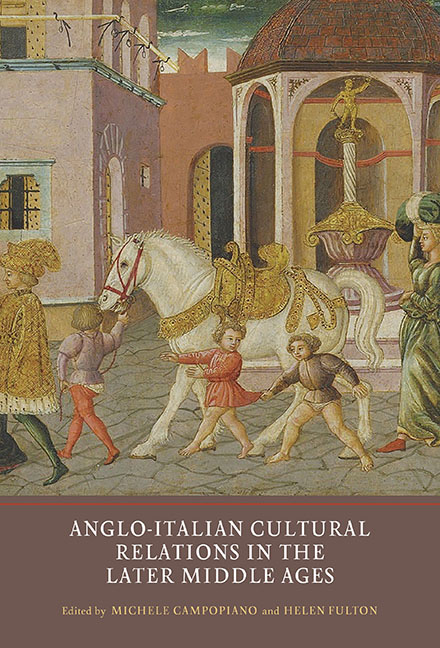Book contents
- Frontmatter
- Contents
- List of Illustrations
- List of Contributors
- Acknowledgements
- List of Abbreviations
- Introduction: Historical and Literary Connections between Britain and Italy in the Middle Ages
- 1 Writing, Translating and Imagining Italy in the Polychronicon
- 2 Richard de Bury, Petrarch and Avignon
- 3 The Reception of Italian Political Theory in Northern England: Bartolus of Saxoferrato and Giles of Rome in York
- 4 Italian Firms in Late Medieval England and their Bankruptcy: Re-reading an Old History of Financial Crisis
- 5 ‘Nostri Fratelli da Londra’: The Lucchese Community in Late Medieval England
- 6 ‘Saluti da Londra’: Italian Merchants in the City of London in the Late Fourteenth and Early Fifteenth Centuries
- 7 Political Joachism and the English Franciscans: The Rumour of Richard II's Return
- 8 Urban History in Medieval and Early Modern Britain: The Influence of Classical and Italian Models
- Afterword: The Nature of Anglo-Italian Cultural Exchanges
- Bibliography
- Index
6 - ‘Saluti da Londra’: Italian Merchants in the City of London in the Late Fourteenth and Early Fifteenth Centuries
Published online by Cambridge University Press: 03 July 2019
- Frontmatter
- Contents
- List of Illustrations
- List of Contributors
- Acknowledgements
- List of Abbreviations
- Introduction: Historical and Literary Connections between Britain and Italy in the Middle Ages
- 1 Writing, Translating and Imagining Italy in the Polychronicon
- 2 Richard de Bury, Petrarch and Avignon
- 3 The Reception of Italian Political Theory in Northern England: Bartolus of Saxoferrato and Giles of Rome in York
- 4 Italian Firms in Late Medieval England and their Bankruptcy: Re-reading an Old History of Financial Crisis
- 5 ‘Nostri Fratelli da Londra’: The Lucchese Community in Late Medieval England
- 6 ‘Saluti da Londra’: Italian Merchants in the City of London in the Late Fourteenth and Early Fifteenth Centuries
- 7 Political Joachism and the English Franciscans: The Rumour of Richard II's Return
- 8 Urban History in Medieval and Early Modern Britain: The Influence of Classical and Italian Models
- Afterword: The Nature of Anglo-Italian Cultural Exchanges
- Bibliography
- Index
Summary
Contact between cultures is sometimes perceived in terms of shared literary, dramatic, musical and visual forms, and thought of largely as a question of the geographical spread of styles and ideas over time. However, there is another, entirely different, dimension to contact between cultures, one which is much more commonplace. It arises from trade, and considering this other dimension necessitates expanding our view to accommodate a wider community and, to match it, a wider sense of what we imagine ‘culture’ to be.
Trade compels people with little or no shared language, and perhaps few shared practices, somehow to forge a deal which is sufficiently attractive and advantageous to satisfy all parties involved. In the later Middle Ages, commerce was based upon personal introductions and repeat business among reliable friends. Partnership and mutual profit were core values. Trade entailed a high degree of trust between parties in many important respects, but firstly in the provision of quality merchandise (usually on the basis of viewing a small sample) and secondly where credit was given (often over a period of years). Both Chaucer (working among London merchants as a controller of wool and petty custom) and Boccaccio (working for the Bardi in Naples) were heavily immersed in the world of international commerce in their early years. It was a literate, numerate and intensely skilled practical world, and its entire purpose was to cross national boundaries. Ordinary traders going about their business built a linguistic, economic and social interface between cultures which provided a foundation for the transmission of what might be labelled ‘higher culture’. The fifteenth-century London mercer William Estfield described gold thread as ore filado while the Southampton merchant John Bentham referred to silk as ceta, both men using Italian terms as everyday words, without hesitation, in the full confidence that they would be widely recognized and understood. The English or Italian businessmen of the late fourteenth and early fifteenth centuries might not consciously have aspired to cultural sophistication themselves (although Chaucer and Boccaccio certainly did), but the numerous points at which their communities intersected were nevertheless vitally important to cultural contact between England and Italy. One of the Venetian galleys which arrived in England just before Christmas 1437, for instance, carried a bale of paper for ‘Titolivio’, described by the London customs collectors as a clerk of the duke of Gloucester – his Ferrara-born poet Tito Livio Frulovisi.
- Type
- Chapter
- Information
- Anglo-Italian Cultural Relations in the Later Middle Ages , pp. 103 - 127Publisher: Boydell & BrewerPrint publication year: 2018



